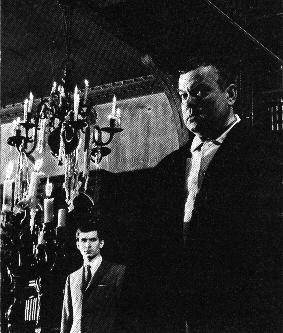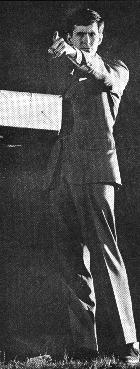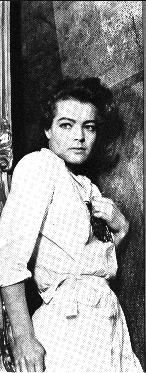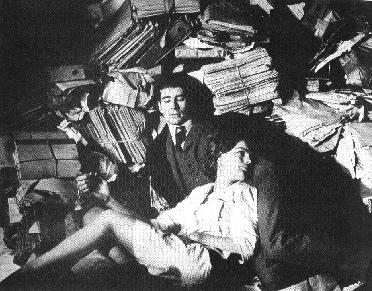The Trial (1963)
 Plot and
My Pseudo-Analysis & Review: The story, of course, of the bank
clerk Joseph K. arrested one morning for no discernible reason. The
movie follows the book fairly closely, although with some differences.
The parable of the man from the country, for example, is moved up to the
very start, giving it somewhat more importance than it had in the book.
The sets in this movie are truly a wonder to behold—cityscapes out of some
future nightmare world, the court offices shot in the then-decrepit Gare
d'Orsay train station in Paris which has an almost mythical resonance
(sort of like a typical infantile but very real and deep fear of Going
To The Principal's Office put on screen), the offices that stretch out
forever; in short the characters are dwarfed by them, which is the visual
version of paranoia used here, as opposed to the book, where such paranoia
exists mostly in Joseph K.'s mind, here it is portrayed outwardly.
Plot and
My Pseudo-Analysis & Review: The story, of course, of the bank
clerk Joseph K. arrested one morning for no discernible reason. The
movie follows the book fairly closely, although with some differences.
The parable of the man from the country, for example, is moved up to the
very start, giving it somewhat more importance than it had in the book.
The sets in this movie are truly a wonder to behold—cityscapes out of some
future nightmare world, the court offices shot in the then-decrepit Gare
d'Orsay train station in Paris which has an almost mythical resonance
(sort of like a typical infantile but very real and deep fear of Going
To The Principal's Office put on screen), the offices that stretch out
forever; in short the characters are dwarfed by them, which is the visual
version of paranoia used here, as opposed to the book, where such paranoia
exists mostly in Joseph K.'s mind, here it is portrayed outwardly.
As far as Anthony Perkins as Joseph K. is concerned,
he's eminently believable as the innocent man wrongly accused...or is he?
He seems to personify nervous guilt, as though he knows somewhere in the
depths of his soul that he is in fact guilty, but the actual crime is irrelevant,
the important thing being his guilt. Knowledge of his earlier role
in Psycho might help here, since after seeing that one, any other
character he plays will almost certainly also be a little off, to put it
mildly, which kind of helps to explain the character. I think the
two movies have a certain paranoia and insanity running through them, also
reflected in any number of cheapo horror flicks of the period (e.g. Them!
and Plan 9 from Outer Space; after all, what else is Psycho
but the premier slasher/horror flick?). This was probably not exactly what Kafka
had in mind when writing the book; nevertheless there is a real connection.
Time in the film has a dreamlike, surreal quality; events simply dissolve
into each other, and time is stretched and compressed. From what is said later in
the movie, it would appear that most of the events take place within a few days;
the second time Joseph arrives at the interrogation room, Hilda talks about the
speech he made "last night," which we know was the day he was arrested, meaning that
somehow the considerable events that occurred before apparently happened in one day.
Apparently Joseph works on the weekend, since that's also supposed to be Sunday night, and we've
seen him in the office both days. By the time he gets out of the law court offices
a little while later, he's already become weary of the Advocate whom he evidently first
visited either last night or that afternoon; on the other hand, mention is
made of visiting the Advocate numerous times, and someone talks about a long-standing
mail correspondence on her cousin Joseph's case—meaning that apparently the timeline
in the film must be pretty screwed up! This playing with time, so to speak, does indeed fit into the dreamy quality of
the movie, although it is a bit confusing.
It is, of course, interesting that all the women
in the movie are sluts or sex objects; what can this possibly mean, asks
the good liberal considering her/himself sensitive to women's concerns.
Naturally the story is considerably more complex than that: it almost implies
that no matter what Joseph is guilty of, it probably concerns sex at least
tangentially. It's as if women are a threat to him. (One of
the more interesting theories propounded about the movie (not the book,
which apparently they didn't read) is that the trial Joseph faces is in
fact the women he encounters; however he isn't very interested in them
since he's basically homosexual. He wants but cannot take.
Hmm. Not that I believe this for a minute, but it makes a bit of
sense when taking into account Perkins's own life.)
Anyway, I thought this was a good film, even though
towards the end it goes completely off on its own angle as far as being
faithful to the book is concerned. The Advocate gets a much bigger
role and seems to represent the Court's point of view. In the book
Joseph K. becomes resigned to his fate, simply hoping to go out with a
modicum of dignity; in the film he absolutely refuses to accept it.
He instead becomes kind of Welles's spokesman for humanity as against the
impersonal forces lined up against him: "Being on the side of man,
I couldn't show him in his final hour undefeated," Welles said, and this
is confirmed by the course the movie takes in the end. And no, I
won't give away the ending, only to say it's somewhat different than the
book. I would recommend this movie, although some cheap tapes of
it are somewhat lacking in the visual department—try to get a decent copy.
Some quotes from the movie:
 Inspector (as Joseph is getting dressed): What do want to
get all dressed up for anyway? You're not going nowhere. You're
under arrest.
Inspector (as Joseph is getting dressed): What do want to
get all dressed up for anyway? You're not going nowhere. You're
under arrest.
(Joseph with Miss Burstner, delivering his little
spiel on guilt.)
Joseph K.: It's never any use, is it, apologizing.
It's even worse when you haven't done anything wrong and you still feel
guilty. I can remember my father looking at me, you know, straight
in the eye: "Come on, boy," he'd say, "exactly what have you been
up to?" And even when I hadn't been up to anything at all I'd still
feel guilty—you know that feeling? And the teacher at school making
the announcement that she was missing something from her desk: "All right,
who's the guilty one?" It was me, of course. I'd feel just
sick
with guilt—and I didn't even know what was missing. Maybe—yeah,
that must be it—unless your thoughts are innocent, one hundred percent.
Can that be said of anybody? Even the saints have temptations...[kisses
Miss Burstner]. What do you think?
Miss Burstner: I think you're crazy.
Miss Burstner: What's your problem?
Joseph K.: I'm under arrest.
Miss Burstner: Yeah?
Joseph K.: Unbelievable, isn't it?
Miss Burstner: Well, it happens.
Joseph K.: Well, that's just the point?I don't
know how it happened. I haven't the remotest idea.
Miss Burstner: How do you know you're arrested?
It isn't something you just suddenly notice like bleeding gums.
 Leni: I know you don't really like me, but I'm going to make love
to you and then you won't be able to go.
Leni: I know you don't really like me, but I'm going to make love
to you and then you won't be able to go.
Joseph K.: Yeah, but what will I say back
there?
Leni: You don't like me at all.
Joseph K.: Well, like is a very feeble word.
Leni: You've got a sweetheart?
Joseph K.: No...
Leni: I bet you do have one. A boy like
you is bound to have somebody.
Joseph K.: Well, as a matter of fact...
Leni: Tell me about her.
Joseph K.: Well, there's not much to tell,
really. I don't even know where she lives anymore. I've got
a photograph.
Leni: Ah, you've got a photograph. [Looks
at it.] What is she, some kind of an actress?
Joseph K.: No, a dancer.
Leni: She's not so young, is she? I
don't think I like her. She looks hard and selfish. A girl
like that wouldn't be able to sacrifice herself for a man.
Joseph K.: Well, certainly not for me.
Leni [whispering]: Has she got any
physical defect?
Joseph K.: What?
Leni [a little louder]: Has she got
any physical defect?
Joseph K.: Why—why no, of course not.
Leni: If you don't know where she's gone,
I guess she doesn't mean much to you or you'd find out.
Joseph K.: I'll find out.
Leni: I—I've got a physical defect.
I'll show you. Come on. Look—skin between my two middle fingers—like
a web!
Joseph K.: What a pretty little paw!
Courtroom Guard [about the law student]:
That student—if my job didn't depend on it, I would have squashed him flat against
the wall here long ago. Right there, just a little bit above the
floor, all splashed in blood, with his arms and his fingers and those bandy
legs of his, all twisted out and writhing like a...smashed cockroach!!
[The climactic "Man from the country" scene in the
cathedral, but with the Advocate taking the place of the priest.
Much of Welles's philosophy is spelled out in this scene.]
Joseph K.: What are you doing in church?
Or am I still in church? Or is this a part of the law court offices?
Advocate: I left my sickbed.
Joseph K.: Well, go back to your sickbed!
Advocate: Joseph, you don't seriously believe
you can defend yourself?
Joseph K.: Defend myself and defy you!
Advocate: Defy the Court?
Joseph K.: All of you! [Bumps into a
table with a slide projector.] What's this?
Advocate: We use visual aids.
Joseph K.: Lectures and sermons!
Advocate: And your particular delusions are
described in the writings which preface the Law. "Before the Law
there stands a guard. A man comes from the country seeking admittance
to the Law. But the guard cannot admit him. Could the man hope
to enter at a later time?"
Joseph K.: I've heard it before. We've
all heard it. The man is dying of old age still waiting there.
And just at the end the guard tells him that the door was meant for him,
only for him!
Advocate: "The guard tells him, 'No one could
enter this door. And now I am going to close it.'" Some commentators
have pointed out that the man came to the door of his own free will.
Joseph K.: And we're supposed to swallow all
that? It's all true?
Advocate: You needn't accept everything as
true, only as necessary.
Joseph K.: God, what a miserable conclusion!
It turns lying into a universal principle.
Advocate: By attempting to defy the Court
by such an obviously mad gesture, you hope to plead insanity? You've
laid some foundation for that claim by appearing to believe yourself the
victim of some kind of conspiracy.
Joseph K.: That's a symptom of lunacy, isn't
it?
Advocate: Delusions of persecution?
Joseph K.: Delusions?
Advocate: Well?
Joseph K.: I don't pretend to be a martyr,
no.
Advocate: Not even...a victim of society?
Joseph K.: I am a member of society.
Advocate: You think you can persuade the Court
that you're not responsible by reason of lunacy?
Joseph K.: I think that's what the Court wants
me to believe. Yes, that's the conspiracy—to persuade us all that
the whole world is crazy, formless, meaningless, absurd. That's their
dirty game. So I've lost my case. What of it? You?you're
losing too. It's all lost. Lost. So what? Does
that sentence the entire world to lunacy? [Leaves the room and runs
into the priest.]
Priest: Can't you see anything at all?
Joseph K.: Of course I'm responsible.
Priest: My son?
Joseph K.: I am not your son.
 A couple of quotes about the movie:
A couple of quotes about the movie:
I couldn't put my name to
a work that implies man's ultimate surrender. Being on the side of
man, I had to show him in his final hour undefeated. . . I do not share
Kafka's point of view in The Trial. I believe that he is a
good writer, but Kafka is not the extraordinary genius that people today
see in him.
He [Joseph K.] is a little
bureaucrat. I consider him guilty . . . He belongs to a guilty society;
he collaborates with it.
What made it possible for
me to make the picture is that I've had recurring nightmares of guilt all
my life: I'm in prison
and I don't know why—going to be tried and I don't know why.
It's very personal for me. A very personal experience, and it's not
at all true that I'm off in some foreign world that has no application
to myself; it's the most autobiographical movie that I've ever made, the
only one that's really close to me. And just because it doesn't speak
in a Middle West accent doesn't mean a damn thing. It's much closer
to my own feelings about everything than any other picture I've ever made.
— Orson Welles
I think the movie (The
Trial) is a bit of a mess....The concept of a guilty Joseph K., a sort
of obsequious and weak hero,
seemed very antithetical to the spirit of Kafka's book. After a couple
of days of shooting I said to Orson (Welles), 'Don't you
think it's going to be interpreted that K. is guilty?' He said, 'He
is
guilty! He's guilty as hell!' And I thought,'Oh, well, okay." I
believed then, as I do now, in the authenticity of the director's vision,
and I'll do anything to make it come true.
— Anthony Perkins, about his role as Joseph K. in The Trial
A Brief Postscript:
The Trial was one of George Orson Welles's
last films; the last to be released through a major studio. He died
of heart failure October 10, 1985 at the age of 70.
Anthony Perkins made plenty of other movies after
The
Trial, including Psycho II, III, and IV. He died of AIDS
September 12, 1992 at the age of 60.
Romy Schneider (real name Rosemarie Albach-Retty)
had quite an interesting career in German, French, and American movies
(she was born in Austria). She died of a heart attack (some rumors
say suicide with sleeping pills) May 29, 1982 at the age of 43.
Credits:
;
Directed by:
Orson Welles
Written by:
Orson Welles
Based on the novel by Franz Kafka
 Starring:
Starring:
Joseph K.
Anthony Perkins
Dr. Hasterer the Advocate
Orson Welles
Leni
Romy Schneider
Miss Burstner
Jeanne Moreau
Mrs. Grubach
Madeline Robinson
Inspector
Arnoldo Foa
Warder (Frank)
William Kearns
Warder
Jess Hahn
Hilda (The Usher's Wife)
Elsa Martinelli
The Usher
Wolfgang Reichmann
Bert (The Student)
Thomas Holzmann
Titorelli
William Chappell
Block
Akim Tamiroff
Uncle Max
Max Haufler
Miss Pittl
Suzanne Flon
Irmie
Maydra Shore
Examining Magistrate
Max Buchsbaum
Chief Clerk
Fernand Ledoux
Priest
Michel Lonsdale
Deputy Manager
Maurice Teynac
Policeman
Raoul Delfosse
Policeman
Jean-Claude Remoleux
Man in Leather
Carl Studer
Clerk
Van Doude
Court Librarian Paola Mori
(Mrs. Orson Welles)
Sites about Orson Welles
The Estate of Orson Welles Website The "official" site.
The G.O.W. (George
Orson Welles) Pages
Touch of Welles
Sites about Anthony Perkins and Psycho
Fans of Anthony Perkins
Hitchcock's Psycho Home Page
Psycho...Check Right In!
Psycho
For more information, visit the Internet
Movie Database. (It's listed as Le Procès, the
French title.)
A couple of reviews:
Bruce Cantwell
Sack [!]
Return to the Movies page.
Back to Leni's Franz Kafka Page.
 Plot and
My Pseudo-Analysis & Review: The story, of course, of the bank
clerk Joseph K. arrested one morning for no discernible reason. The
movie follows the book fairly closely, although with some differences.
The parable of the man from the country, for example, is moved up to the
very start, giving it somewhat more importance than it had in the book.
The sets in this movie are truly a wonder to behold—cityscapes out of some
future nightmare world, the court offices shot in the then-decrepit Gare
d'Orsay train station in Paris which has an almost mythical resonance
(sort of like a typical infantile but very real and deep fear of Going
To The Principal's Office put on screen), the offices that stretch out
forever; in short the characters are dwarfed by them, which is the visual
version of paranoia used here, as opposed to the book, where such paranoia
exists mostly in Joseph K.'s mind, here it is portrayed outwardly.
Plot and
My Pseudo-Analysis & Review: The story, of course, of the bank
clerk Joseph K. arrested one morning for no discernible reason. The
movie follows the book fairly closely, although with some differences.
The parable of the man from the country, for example, is moved up to the
very start, giving it somewhat more importance than it had in the book.
The sets in this movie are truly a wonder to behold—cityscapes out of some
future nightmare world, the court offices shot in the then-decrepit Gare
d'Orsay train station in Paris which has an almost mythical resonance
(sort of like a typical infantile but very real and deep fear of Going
To The Principal's Office put on screen), the offices that stretch out
forever; in short the characters are dwarfed by them, which is the visual
version of paranoia used here, as opposed to the book, where such paranoia
exists mostly in Joseph K.'s mind, here it is portrayed outwardly.
 Inspector (as Joseph is getting dressed): What do want to
get all dressed up for anyway? You're not going nowhere. You're
under arrest.
Inspector (as Joseph is getting dressed): What do want to
get all dressed up for anyway? You're not going nowhere. You're
under arrest.
 Leni: I know you don't really like me, but I'm going to make love
to you and then you won't be able to go.
Leni: I know you don't really like me, but I'm going to make love
to you and then you won't be able to go.
 A couple of quotes about the movie:
A couple of quotes about the movie:
 Starring:
Starring: